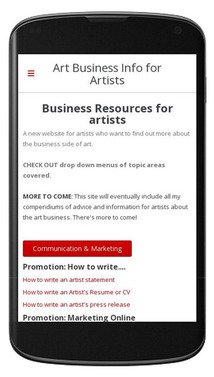- Home
- NEWS
-
PRACTICE
-
MARKETING
- How to write an Artist's Statement >
- How to write an Artist's Resume or CV >
- How to sign a painting, drawing or fine art print
- Business Cards for Artists
- How to write a press release for an artist
- The Private View Invitation
- Publicity for Juried Exhibitions
- Websites for Artists >
- Image & Video sizes for Social Media Sites
- How to be mobile-friendly
-
SELL ART
- FRAME ART
-
SHIP ART
-
COPYRIGHT
-
MONEY & TAX
- About + Help
- BANKING
Is your website or blog mobile-friendly?
It is now absolutely essential to have a mobile-friendly website or blog if you intend people to access it without difficulty.
|
It's ABSOLUTELY ESSENTIAL to get to grips with what's involved in being mobile-friendly now that:
This page covers:
|
Two tools to test mobile-friendliness
The two main search engines both have a tool to test out whether or not a website or blog is mobile friendly.
I recommend you use both as I find they give slightly different results. This is what this website looks like on the Google Mobile-Friendly Test
|
The Mobile Friendly Check List
Accessible
|
Technically efficient and effective
|
|
Is it easy to navigate using a mobile device?
Can you read the text easily?
Is scrolling easy?
|
Does the content resize to the size of the viewable screen?
Does it load quickly using mobile broadband? Is it compatible with all devices?
Do URLs and html stay the same? Does it pass the Google Mobile-Friendly Test?
|
Prioritising for mobile devices
|
Responsive templates
|
|
It's essential that a website works well on a mobile device for the customer. That means:
Google recommends that you Optimize your entire site for mobile devices. Google now ranks websites accessed via mobile devices by whether or not the website has been optimised for a mobile experience. If you've not updated your website will not rank well for mobile devices. Mobile devices are now the technology of choice for many people browsing websites.
|
Responsive templates enable a web design to resize automatically for any screen size. Plus when using a responsive web design:
Google recommends responsive web design and provides some excellent advice about:
|
More about mobile indexing and being mobile-friendly for search engines
Mobile-first indexing means Google predominantly uses the mobile version of the content for indexing and ranking. Google |
Mobile-first is happening whether you like it or not If you have different websites for mobile and desktop and your mobile website has far less content – you do have something to worry about. Yoast |
|
Getting Started - includes tips on:
Google is aiming to have just one index - for all desktop and mobile sites at some point in the future. It's been giving more and more priority to mobile-first indexing over time.
|
Mobile Indexing: Google emphasises mobile indexing.
|
REFERENCE: from non-Google sources
- Mobile-First Indexing – The Complete Guide | Marion Haynes - she aims to provide everything you need to know about mobile-first indexing and her updates to her guide stay on this url.
- Mobile-first indexing | Yoast (2020)
Bing
- Our approach to mobile-friendly search | Bing - this is what matters to Bing
- Mobile Friendliness | Bing - This article describes the Mobile Friendliness Test Tool and the factors that determine mobile friendliness
ABOUT ART BUSINESS INFO. FOR ARTISTS
This website aims to provide a compendium of resources about the art business for artists. Please read "PLEASE NOTE"
It helps artists learn how to do better at being business-like, marketing and selling their art and looking after their financial security.
This website aims to provide a compendium of resources about the art business for artists. Please read "PLEASE NOTE"
It helps artists learn how to do better at being business-like, marketing and selling their art and looking after their financial security.
|
Copyright: 2015-2021 Katherine Tyrrell | Making A Mark Publications
- all rights reserved If you've got any suggestions for what you'd like to see on this website please send me your suggestion
|
PLEASE NOTE:
1) Content and the law change all the time. It's impossible to keep up with it if you're not working on the topic full time. 2) I research topics carefully. However, I am totally unable to warrant that ANY and/or ALL information is
|
3) Hence all information I provide comes without any LIABILITY whatsoever to you for any choices you make.
4) This website is FREE FOR YOU but not for me. Links to books are Amazon Affiliate links. Buying a book via this website means I get a very small payment which helps to fund and maintain this website. .I much appreciate any support your provide. Adverts are provided by Google AdSense - but the adverts do not mean I endorse the advertiser. |
- Home
- NEWS
-
PRACTICE
-
MARKETING
- How to write an Artist's Statement >
- How to write an Artist's Resume or CV >
- How to sign a painting, drawing or fine art print
- Business Cards for Artists
- How to write a press release for an artist
- The Private View Invitation
- Publicity for Juried Exhibitions
- Websites for Artists >
- Image & Video sizes for Social Media Sites
- How to be mobile-friendly
-
SELL ART
- FRAME ART
-
SHIP ART
-
COPYRIGHT
-
MONEY & TAX
- About + Help
- BANKING
